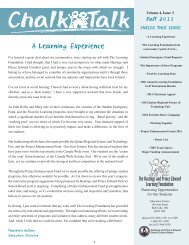Grade 11 Healthy Active Living Education Additional Supports ...
Grade 11 Healthy Active Living Education Additional Supports ...
Grade 11 Healthy Active Living Education Additional Supports ...
Create successful ePaper yourself
Turn your PDF publications into a flip-book with our unique Google optimized e-Paper software.
Positive Mental Health and Stress<br />
Public Profile<br />
Unit #3 Activity #4<br />
Teaching Learning Strategy #4<br />
Teacher Resource (Answer Sheet)<br />
Myth or Fact<br />
Catholic Profile<br />
Unit #5 Activity #2<br />
Teaching Learning Strategy #3<br />
1. You can always tell when someone is experiencing a mental illness.<br />
MYTH: Not all people who look or act differently are mentally ill. Some people who<br />
exhibit eccentric behaviour and mannerisms do so as a matter of choice and not because<br />
of mental illness.<br />
2. People with mental illnesses are to blame for their condition.<br />
MYTH: A mental illness is not a character flaw, it is a disease. Mental illnesses can affect<br />
people from all walks of life. Having a mental illness has nothing to do with being weak<br />
or lacking will power. People do not choose to be mentally ill, nor are they being lazy for<br />
not snapping out of it.<br />
3. Mental illnesses are long-term illnesses.<br />
MYTH: mental illnesses are not necessarily long-term. It is possible for an episode of<br />
illness to last just one or two months out of an entire lifetime. In fact, the average stay in<br />
the hospital for 97% of psychiatric patients is 33 days. Furthermore, while a person may<br />
have several episodes of mental illness in their lifetime they may have long periods of<br />
healthy living in between.<br />
4. People with mental illness are more violent than other people.<br />
MYTH: Violence is not a characteristic of mental illness. Mental illnesses are usually<br />
quite devastating and embarrassing to people. As a result, people with mental illnesses<br />
tend to be anxious and timid and are more likely to withdraw than attack.<br />
5. Mental illness can be associated with low intelligence.<br />
MYTH: On the contrary, people with mental illnesses may be as intelligent as anyone<br />
else. If anything, studies suggest that most people with mental illnesses have an average<br />
or above average IQ.<br />
For more information, see list of resources on page 886 and 87.<br />
<strong>Grade</strong> <strong>11</strong> <strong>Healthy</strong> <strong>Active</strong> <strong>Living</strong> <strong>Education</strong> (PPL30), Module #2 Positive Mental Health and Stress<br />
Page 63
















